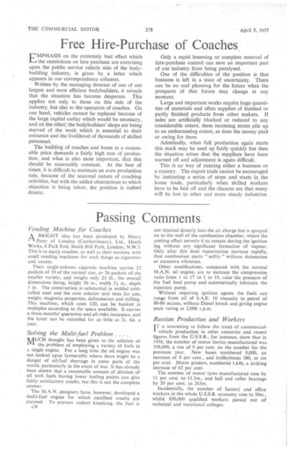Free Hire-Purchase of Coaches.
Page 30

If you've noticed an error in this article please click here to report it so we can fix it.
EMPHASIS on the extremely bad effect which the restrictions on hire purchase are exercising upon the public service vehicle side of the bodybuilding industry, is given by a letter which appears in our correspondence columns.
Written by the managing director of one of our largest and most efficient bodybuilders, it reveals that the situation has become desperate. This applies not only to those on this side of the industry, but also to the'operators of coaches. On one hand, vehicles cannot be replaced because of the large capital outlay which would be necessary, and on the other: the bodybuilders' shops are being starved of the work which is essential to their existence and the livelihood of thousands of skilled personnel..
The building of coaches and buses at a reasonable price demands a fairly high rate of production, and what is also most important, that this should be reasonably constant. At the best of times, it is difficult to maintain an even production rate, because of the seasonal nature of coaching activities, but with the added obstructions to which objection is being taken, the position is indeed drastic. Only a rapid lessening or complete removal of hire-purchase control can save an important part of our industry from being paralysed.
One of the difficulties of the position is that business is left in a state of uncertainty. There can be no real planning for the future when the prospects of that future may change at any moment.
Large and important works require huge quantities of materials and often supplies of finished or partly finished products from other makers. If sales are artificially blocked or reduced to any considerable extent, these incoming stores pile up to an embarrassing extent, as does the money paid or owing for them.
Admittedly, when full production again starts this stock may be used up fairly quickly but then the situation arises that the suppliers have been warned off and adjustment is again difficult.
This is no way of running either a business or a country. The export trade cannot be encouraged by instituting a series of stops and starts in the home trade, particularly when skilled workers have to be laid off and the chances are that many will be lost to other and more steady industries.
















































































































